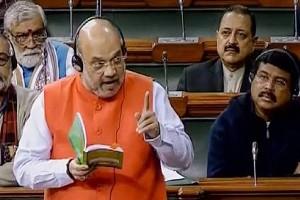What is Citizenship Amendment Bill? - Brief Report
Home > News Shots > India newsCAB

The Citizenship (Amendment) Bill 2019 or CAB was cleared by the Union Cabinet on 4 December 2019, passed by Lok Sabha on 10 December 2019 (with 311 votes against 80) and Rajya Sabha on 11 December 2019. The bill provides privileges to acquire Indian Citizenship for non-Muslims of Afghanistan, Pakistan and Bangladesh.
The bill will be sent to President of India for his approval which was voted in favour by 125 lawmakers against 99. On 11 December 2019, the CAB was passed after 6 hours of debate allocated by Rajya Sabha Chairman and Vice President Venkaiah Naidu. Other parties to support the bill are D(U), SAD, AIADMK, BJD, TDP and YSR-Congress. Shiv Sena did not take part in the voting.
How CAB Works?
Basically the Citizenship (Amendment) Bill amends the Citizenship Act of 1955 according to which the illegal migrants (Hindus, Sikhs, Buddhists, Jains, Parsis and Christians) from Pakistan, Afghanistan and Bangladesh who entered India on or before December 31, 2014, are eligible for Indian citizenship.
To put it in simple words, immigrants who belong to the above-mentioned religions will be granted Indian Citizenship though they do not carry a valid document to prove their residency. Therefore, immigrants who belong to other religions are not eligible for Indian Citizenship.
Further, the amendment reduced the immigrants' duration from 11 years to 5 years i.e. Immigrants who belong to the mentioned religions and entered India on or before December 31, 2014, will no longer be treated as immigrants.
CAB is not Applicable Here
The Citizenship (Amendment) Bill excluded areas in the North-East such as Assam, Meghalaya, Mizoram and Tripura. These major tribal areas are not supported by CAB as per the Sixth Schedule of the Constitution and the area covered under the Inner Limit notified under the Bengal Eastern Frontier Regulation, 1873.
Therefore people from Arunachal Pradesh, Nagaland and Mizoram along with almost whole of Meghalaya and parts of Assam and Tripura will not be granted Indian Citizenship.
Overseas Citizens
The CAB provides privileges to the Overseas Citizens of India (OCI) cardholders under the 1955 Act. As per the act, any individual who has the Indian origin are eligible to register as OCI. For instance, a former citizen of India or their descendants or the spouse of a person of Indian origin can register as OCI.
OCI cardholders can avail provisions such as the right to travel to India and to work and study in the country. The OCI registration is also subject to cancellation if found that any individual has violated any law notified by the Central government.
According to the latest report, the CAB has been approved by the president of India, Ram Nath Kovind and has become an Act.
